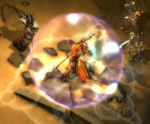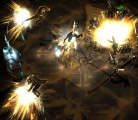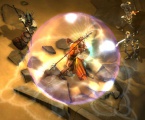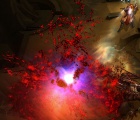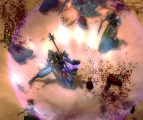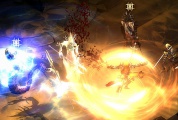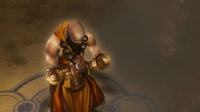Difference between revisions of "Monk"
(→References) |
(→Class Design) |
||
| Line 38: | Line 38: | ||
[[Jay Wilson]] mentioned [[D3 Team]] wanted to make a character than isn't necessarily one of the easiest characters to start with, but the Monk will even out with the other classes later on in both power and difficulty. | [[Jay Wilson]] mentioned [[D3 Team]] wanted to make a character than isn't necessarily one of the easiest characters to start with, but the Monk will even out with the other classes later on in both power and difficulty. | ||
| + | |||
| + | ::With the Monk, we really wanted another melee class, but we wanted him to be the polar opposite of the Barbarian. Somebody who focused on speed over toughness, who could use magic where the Barbarian really doesn’t, and who had a combat style that required a little bit more finesse. He’s kind of the opposite of the, “I’m going to run in and try to overwhelm all my enemies with my sheer ferocity.” | ||
| + | |||
| + | ::For the Monk, we really were inspired by fighting game characters and games like God of War, where we wanted a character that could do really cool moves in rapid succession. So, we decided to do a combo system for him where many of his combat skills have different stages to them so as you use them, you move from stage 1 to stage 2 to stage 3. You can mix and match abilities as well and put them together. | ||
| + | |||
| + | ::So with the other classes [in multiplayer], the Monk moves forward because he’s faster than everyone else, and gets in front of the fight. He tends to disable enemies a lot. He can blind them. He can debuff them. If he stays, however, he could be in trouble because he’s a lot more fragile than the Barbarian. So, then he’ll step back and then all of his friends can come in. He can certainly do a lot of damage. If used right, he’s ridiculously powerful. We have a lot of skills that focus on placing something on a monster. For example, we have the Exploding Palm skill where the third stage will place a bleed damage-over-time (DoT) effect on the monster. If the monster dies while this DoT is on him, and there’s a high chance that he will, the monster explodes and does damage to everyone around him. So it really supports this idea of, “He runs in. He does something and then he backs off or goes after another monster because he knows the first monster is already dead.” | ||
| + | -- [http://g4tv.com/games/pc/28197/diablo-iii/articles/68225/BlizzCon-2009-Diablo-III-Game-Director-Interview/ Jay Wilson interview] | ||
| + | |||
| + | |||
Revision as of 06:30, 9 September 2009
The Monk is a melee/caster hybrid, with focus on martial arts close combat. He is like a mix between the Assassin and Paladin from Diablo II, and shares a few traits with the Monk from Diablo: Hellfire.
Contents
Background
| Diablo III Class [e] | |
|---|---|
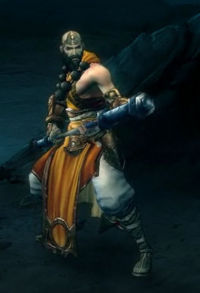
| |
| Monk | |
| Role: | Melee/Caster |
| Primary Attributes: | Strength Dexterity Vitality Willpower Life Mana |
|
Skills and Traits | |
| Origin: | Sanctuary |
| Affiliation: | Monks of Ivgorod |
| Friends: | None Known |
| Foes: | None Known |
The male Monk character comes from the Monasteries of Ivgorod in the Foothills. They are taken into the Monastery at a young age, where they are taught ancient knowledge; the belief in 1001 gods that dwell within everything (one god in water, one god in fire, one god in the air, etc.), martial arts, and meditation to purify the body and soul.
The Monks have a fondness for structure and creativity, which is why they have various symbols on their bodies. Their light magic is brought to life through runes, symbols that invoke the light to aid them. It is said that each Monk has a tattoo on his back, that chronicles their lifetime/adventures (needs confirmation), and that it may take a monk an entire lifetime to complete the tattoo on his back.
The monk serves the Elder Monks of the monastery, who seek to destroy evil in all forms. He thinks of himself as the weapon of the gods against all that is evil. He is a peaceful, patient and good man who aids those who suffer, with no hatred against anyone, in contrast to the Barbarian. He is adept in Martial Arts, being able to defeat multiple foes without the aid of weapons.
Class Design
The "theme" of the Society of Monks is a mix of "spiritual" Buddhism and "eradication of evil" of the European churches while maintaining an Asian/Indian visual theme. Abd al-Hazir writes about an encounter with a Monk in a tavern, in his 32nd entry of the Writings of Abd al-Hazir.
The monk was partly made as an opposite to the Barbarian, with more focused gameplay. He is also relatively weak, so a lot of the class design is built upon the monk debuffing his foes, to receive less damage himself.
Jay Wilson mentioned D3 Team wanted to make a character than isn't necessarily one of the easiest characters to start with, but the Monk will even out with the other classes later on in both power and difficulty.
- With the Monk, we really wanted another melee class, but we wanted him to be the polar opposite of the Barbarian. Somebody who focused on speed over toughness, who could use magic where the Barbarian really doesn’t, and who had a combat style that required a little bit more finesse. He’s kind of the opposite of the, “I’m going to run in and try to overwhelm all my enemies with my sheer ferocity.”
- For the Monk, we really were inspired by fighting game characters and games like God of War, where we wanted a character that could do really cool moves in rapid succession. So, we decided to do a combo system for him where many of his combat skills have different stages to them so as you use them, you move from stage 1 to stage 2 to stage 3. You can mix and match abilities as well and put them together.
- So with the other classes [in multiplayer], the Monk moves forward because he’s faster than everyone else, and gets in front of the fight. He tends to disable enemies a lot. He can blind them. He can debuff them. If he stays, however, he could be in trouble because he’s a lot more fragile than the Barbarian. So, then he’ll step back and then all of his friends can come in. He can certainly do a lot of damage. If used right, he’s ridiculously powerful. We have a lot of skills that focus on placing something on a monster. For example, we have the Exploding Palm skill where the third stage will place a bleed damage-over-time (DoT) effect on the monster. If the monster dies while this DoT is on him, and there’s a high chance that he will, the monster explodes and does damage to everyone around him. So it really supports this idea of, “He runs in. He does something and then he backs off or goes after another monster because he knows the first monster is already dead.”
Combat System

The Monk's concept was that of a fighting game character, where the player could create combos by pressing the right buttons at the right time. This being not so different with the Monk, as almost all skills have 3 stages. Each stage of each skill performs a specific action. The player can chain these stages into a combo, being able to create 64 different combos from only 4 spells. In addition to that, many custom combos can be made that fit the player's style of combat.
Using a skill will cast the first stage of that skill. The player has a 0.6 second window to press the skill again to advance to the next stage of that (or a different) skill, that may lead to the 3rd stage of said skill. Alternatively, the player can wait for the 0.6 second window to pass, to re-use the first stage of the skill.
An Example:
- Use/Objective of Skill(s): Easy for Beginners, Depth for veterans.
- Stage One: Way of the Hundred Fists, move in close to the enemies.
- Stage Two: Crippling Wave, lower the damage of the enemies.
- Stage Three: Exploding Palm, Apply the DoT to a damaged enemy and watch the bunch of monsters go boom! (make sure the enemy dies before the bleed ends)
During the BlizzCon 2009 Diablo 3 Heroes and Monsters panel, it was said that the combat style was influenced by the combat styles of the Assassin in Diablo 2: Lord of Destruction and the Rogue class in World of Warcraft.
Attributes and Skills
Monk Skills
The Monk skill trees as revealed at BlizzCon 2009 were clearly works in progress, with temporary names and the skills grouped in what seemed to be random clusters. There were no prerequisites or synergies of any kind.
The monk uses a very special combat system that is better explained above.
Tree A Skills
The A-Tree seems to be a "Combat" skill tree, with skills related to dodging, or maneuvering in combat.
- Tier 2 Skills
- Tier 3 Skills
- Tier 4 Skills
Tree B Skills
The B-skills resemble a debuffing tree, where you make your opponents weaker (or part of your arsenal with Exploding Palm.
- Tier 1 Skills
- Tier 2 Skills
Tree C Skills
The C-skills seem to be the "Holy" skills, with power infused by the Light, especially Impenetrable Defense.
- Tier 1 Skills
- Tier 2 Skills
Development
The Monk was the Fourth class to be revealed by Blizzard, debuting during the opening ceremony of BlizzCon 2009, in front of 26,000 cheering fans and countless DirecTV viewers. As with much of Diablo III, the D3 team took inspiration from old Pen and Paper RPGs and from Fighting Games/Console Brawlers.
There is no female Monk at the moment, but according to Jay Wilson, the creation of the female Monk is in progress.
The Monk was first heard of almost a year ago, shortly after the Wizard was unveiled at BlizzCon 2008. Jay Wilson just commented and said us fans would love it [1].
Trivia
The monks symbol is the mitsudomoe, a triple tomoe. It's used in family crests but also associated with Okinawa where many martial arts originated.
Media
You can find pictures in the Diablo 3 screenshot and picture gallery:
Monk using Seven Sided Strike.
A bubble of his own: Impenetrable Defense.
References
| Monk skill categories: Primary Secondary Defensive Techniques Focus Mantras |
|---|
|
Fists of Thunder |
Deadly Reach |
Crippling Wave |
Way of the Hundred Fists |
[e] |
|
Lashing Tail Kick |
Tempest Rush |
Wave of Light |
[e] |
|
Blinding Flash |
Breath of Heaven |
Serenity |
Inner Sanctuary |
[e] |
|
Dashing Strike |
Exploding Palm |
Sweeping Wind |
[e] |
|
Cyclone Strike |
Seven-Sided Strike |
Mystic Ally |
[e] |
|
Mantra of Evasion |
Mantra of Retribution |
Mantra of Healing |
Mantra of Conviction |
[e] |


